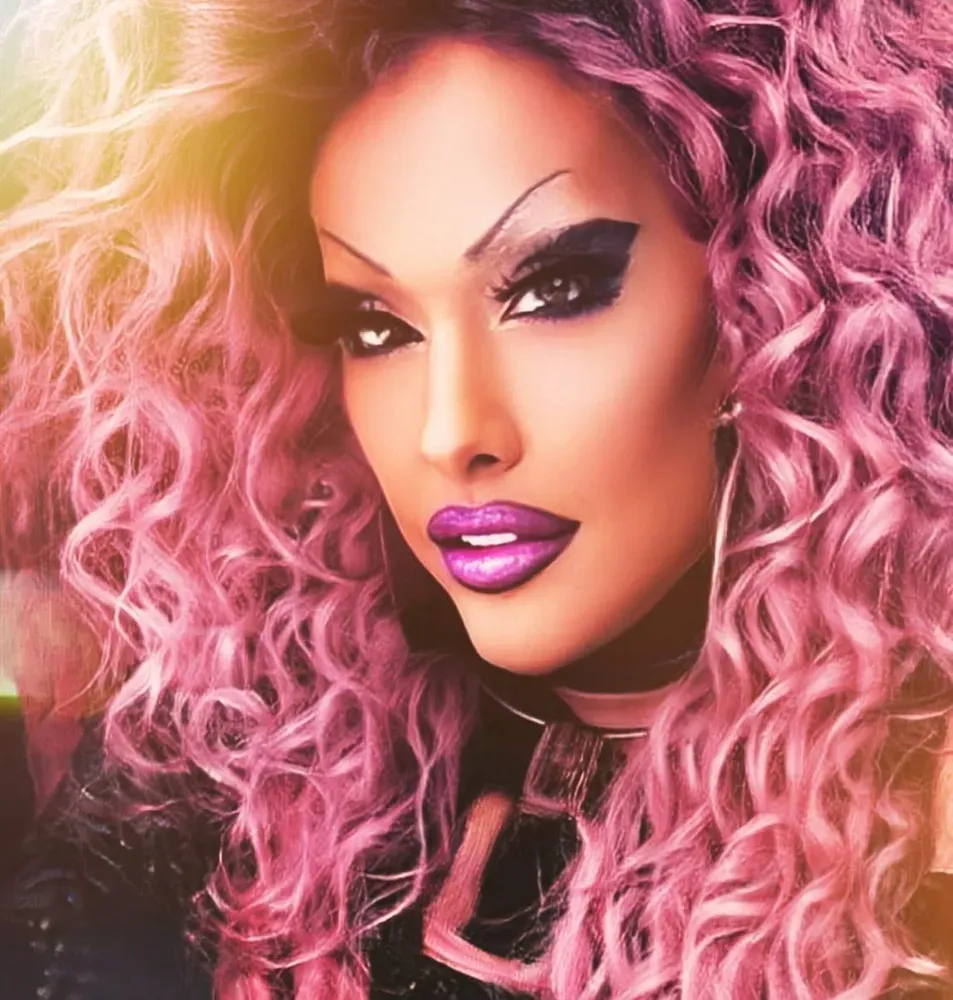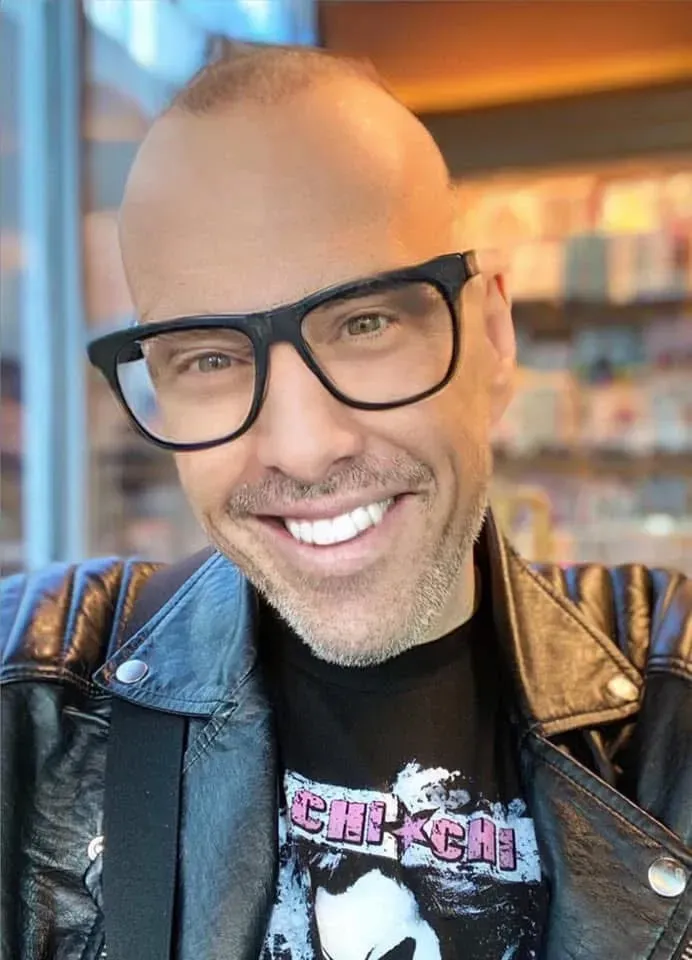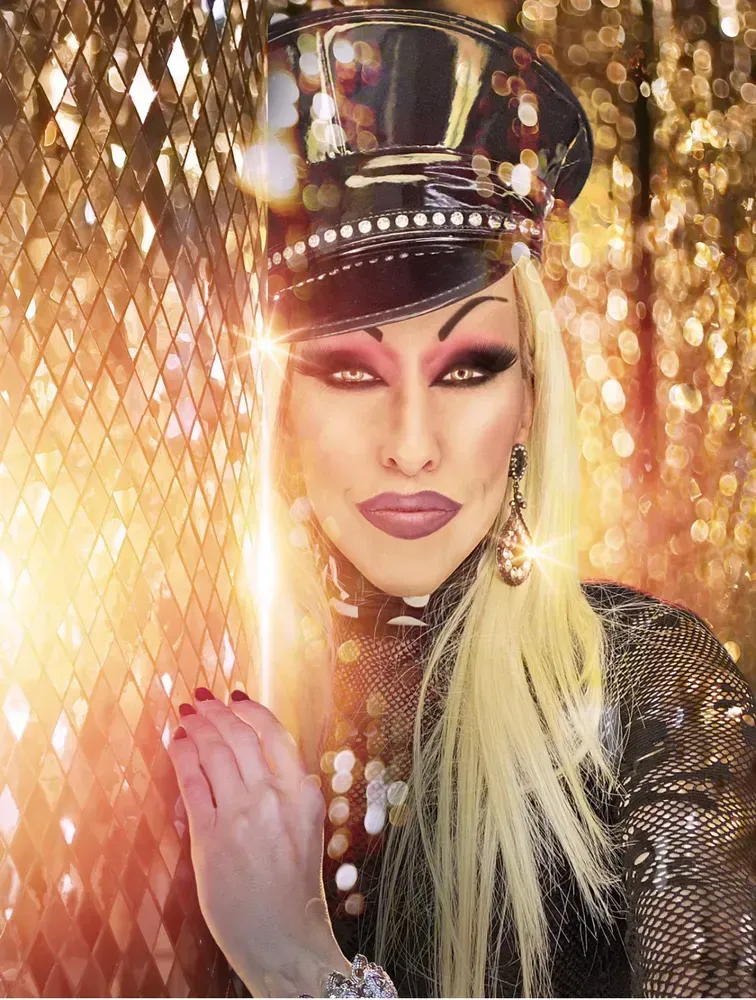Reprinted with permission from Stonewall News Northwest
Chi-Chi LaRue, born Larry David Paciotti on November 8, 1959, in Hibbing, Minnesota, is a name synonymous with boldness, creativity, and unapologetic authenticity, a trailblazer in the drag and adult entertainment industries. LaRue’s journey from a small-town upbringing to becoming a celebrated icon is nothing short of extraordinary.
Although I had heard the name Chi-Chi LaRue, I knew little about the person behind it. Intrigued, I decided to reach out, and to my surprise and delight, LaRue responded. What followed was a warm and candid conversation that left me feeling like I had just spoken to an old friend. LaRue’s charm, humor, and openness put me entirely at ease.
In the early 1980s, Larry Paciotti moved to Minneapolis, where he began performing in drag as Chi-Chi LaRue (pronounced “She-She Lah Roo”). The persona was larger-than-life — flamboyant, brash, and unapologetically fabulous. LaRue quickly became a local sensation, captivating audiences with a mix of humor, charisma, and undeniable talent. This stark contrast to the quieter Paciotti marked the beginning of a lifelong reinvention.
In 1986, LaRue relocated to Los Angeles, a city brimming with opportunities for someone with ambition and flair. Initially hired by Catalina Video as a publicist and sales representative, [he demonstrated a] deep understanding of the adult film industry that soon set him apart. By 1989, he made his directorial debut under the pseudonym Taylor Hudson, as his drag name was considered too feminine for the industry at the time.
LaRue’s career as a director flourished, with hundreds of films to his name, primarily for Falcon Studios. He later expanded his work to include collaborations with Vivid Video and his own label, Rascal Video. LaRue’s films were known for pushing boundaries, blending storytelling with eroticism in a way that challenged norms. Titles like Lost in Vegas and Heaven2Hell (Parts 1 & 2), showcased his ability to create compelling narratives within the adult genre.
Beyond his creative vision, LaRue became a vocal advocate for safer sex practices in the adult film industry. In 2006, he famously refused to work with studios that did not require condom use, setting a standard for responsibility and care in a field often criticized for its lack of regulation.
LaRue’s influence extended far beyond the adult film world. He directed music videos, including one for RuPaul’s Drag Race alum Willam Belli, and even performed in a glam-rock band called the Johnny Depp Clones. His drag persona allowed him to connect with audiences in ways that transcended the adult industry, making him a beloved figure in the Queer community.
In addition to his many accomplishments, LaRue made a guest appearance in Madonna’s 1992 music video for Deeper and Deeper, further cementing his status as a pop culture icon.
To gain a deeper understanding of LaRue’s experiences and insights, I took the opportunity to ask him several questions. He graciously shared his thoughts, providing a more personal glimpse into his journey.

Frank Gaimari: What inspired you to create the drag persona Chi-Chi LaRue, and how has it evolved over the years?
Chi-Chi LaRue: When I first started doing drag with three friends, we called ourselves the Weather Gals. Our style was more of a “hag drag.” We didn’t take it too seriously, but the crowds absolutely loved us. We ended up winning several drag contests at First Avenue, the iconic venue where Purple Rain was filmed. In fact, I had the incredible experience of being in Purple Rain myself, which was truly unforgettable.
FG: What role do you think drag plays in shaping Queer culture and visibility today?
CL: I believe drag is a powerful expression of Queer culture, and I absolutely love it. Drag is not only fun but also incredibly informative. Icons like Sister Roma and many others use drag as a platform to educate and fight against oppression. Drag queens are often the first to step up and help in any situation that threatens Gay or Queer existence.
While I have a deep appreciation for old-school drag, I also enjoy shows like RuPaul’s Drag Race. However, I think the show has given some people the impression that if you’re not doing a death drop, flying from the ceiling, or performing cartwheels, then you’re not doing drag, which couldn’t be further from the truth. I’m good friends with RuPaul and many of the queens who have competed on the show. That said, I’ve also encountered some queens from the show who aren’t very friendly and have let the fame go straight to their heads — just being honest, lol!
FG: What was it like directing your first adult film?
CL: I was both terrified and incredibly eager. My head was swirling with ideas, but I had no idea what I was doing — truly flying by the seat of my pants. The first movie I directed was called Flexxx for In Hand Video, marking my debut feature film. Before that, I directed a segment for William Higgins in the movie Hardman, which featured men dancing, stripping, and performing solo scenes. I must admit, my segment was the standout of the series, at least in my opinion!
After directing my first movie, I was utterly hooked. That first experience sparked a passion that led to a directing career spanning over 40 years. Over the decades, I’ve had the privilege of creating some truly exciting and memorable films... and, admittedly, a fair share of not-so-great ones. Let’s say it’s been a wild ride!
FG: You’ve worked with some iconic performers. What do you look for when casting talent for your movies?
CL: I was always taught that if a guy had two out of three key qualities, he was a contender for a movie. Those three qualities were: face, body, and dick! These days, it feels like porn stars are falling out of the sky, and the content creators on platforms like Just for Fans are stunning. It’s incredibly exciting to see how the industry has evolved!

FG: How do you approach storytelling in adult films, and what sets your work apart from others in the industry?
CL: I’ve always had a knack for coming up with concepts. Honestly, you can turn just about anything into a porn movie: two guys walking down the street, someone painting a house — the possibilities are endless. You can also dive into more fantastical themes, as I did with my movies Heaven2Hell [and] Night Riders, and my Link series.
To this day, I think my favorite movie I ever directed was a story-driven film called Wrong Side of the Track, starring Johnny Hazzard. The concept for that movie came from a simple video clip Steven Walker shot in Palm Springs. It showed Johnny walking down the railroad tracks, and after watching it, I was inspired to create an entire movie around that moment.
FG: You’ve been a vocal advocate for safer sex practices in the adult industry. What motivated you to take that stand?
CL: It was alarming to see that people were still making movies without practicing safer sex. When I started, I knew I couldn’t take part in those practices. At the time, some were resorting to unorthodox and misguided methods, like squirting nonoxynol-9 into people’s bodies, thinking it would offer protection. I took a strong and vocal stand against it, and I’m proud to say I helped change the minds of prominent industry leaders, including Chuck Holmes from Falcon, who eventually adopted condom use in productions.
My commitment to safer practices wasn’t limited to Gay productions — I also refused to make straight films without using condoms, including the movies I directed for Vivid. I believe the women I worked with truly appreciated that stance, and it reinforced the importance of prioritizing health and safety in the industry.
FG: What are some misconceptions people have about the adult film industry, and how would you address them?
CL: I think many people assume that an adult film set is filled with drugs and sex even before the cameras start rolling, but that couldn’t be further from the truth. In fact, I once kicked down a bathroom door because some of my actors were doing crystal meth in the bathroom of the location. I had to pay for the door, but it was worth it.
As someone who has struggled with alcoholism and addiction myself, I was determined not to let that kind of behavior be a part of my productions. It was important to me to maintain a professional and respectful environment on set.
FG: How did your struggles with addiction impact your life and career, and what led you to seek help?
CL: I made a lot of mistakes during my drinking days, and I even lost a couple of drag and DJ gigs because of it. Thankfully, I have some of the most incredible friends who stood by me and supported me during my times of need, even when I slipped up. I’m endlessly grateful to them and always will be.
FG: What advice would you give to others in the LGBTQ+ community who may be struggling with addiction?
CL: As a chronic relapser myself (though I truly hope those days are behind me), I’ve learned that people won’t seek help until they’re ready or have hit their rock bottom. I’ve witnessed the devastating effects of substance abuse, particularly with drugs like crystal meth. I’ve seen people lose themselves, fade away, or even lose their lives unnecessarily. It’s heartbreaking every time.
FG: Looking ahead, what are your goals for the future, both personally and professionally?
CL: I’m going to keep doing the things I love, like DJing and drag, until the wheels fall off — why stop now? Currently, I’ve faced resistance from specific individuals who are trying to prevent me from continuing to direct. It’s more challenging these days, with so many content creators doing their own thing, which I think is fantastic. However, I believe the era of making full-length movies is slowly becoming a thing of the past.
One thing I still thoroughly enjoy is being part of the Chicago Grabby Awards, which I’ve had the honor of hosting for the past 26 years. I’m excited to say I’ll be hosting again in 2026 — it’s always such a highlight for me!
FG: If you could design a museum exhibit about your life and career, what would be the centerpiece, and why?
CL: That’s a tough question to answer because I’ve had so many exciting moments in my life. I’ve been fortunate enough to meet some of my idols, many of whom I’m still friends with today — icons like Elton John, Boy George, Andy Bell of Erasure, RuPaul, and Rob Halford of Judas Priest. I even had the incredible experience of being in Purple Rain with my idol, Prince, and appearing in a Madonna video — two artists I absolutely adore.
I’ve been truly blessed and fortunate to do so many things I once could only dream about. And the best part? I feel like there’s still so much more to come!
Chi-Chi LaRue’s journey embodies the spirit of reinvention and the importance of staying true to oneself. Whether behind the camera or in front of an audience, LaRue continues to inspire and entertain, leaving an indelible mark on the entertainment and film industries. It’s clear that Chi-Chi LaRue is not just a name — it’s a legacy.
Join Chi-Chi LaRue’s Facebook community at https://www.facebook.com/chichilarue .
Frank Gaimari is an author and film reviewer in Seattle. He lives with his husband and their two golden retrievers. Learn more about his work at www.FranksFilmReview.com .
Support the Seattle Gay News: Celebrate 51 Years with Us!
As the third-oldest LGBTQIA+ newspaper in the United States, the Seattle Gay News (SGN) has been a vital independent source of news and entertainment for Seattle and the Pacific Northwest since 1974.
As we celebrate our 51st year, we need your support to continue our mission.
A monthly contribution will ensure that SGN remains a beacon of truth and a virtual gathering place for community dialogue.
Help us keep printing and providing a platform for LGBTQIA+ voices.
How you can donate!
Using this link: givebutter.com/6lZnDB
Text “SGN” to 53-555
Or Scan the QR code below!



